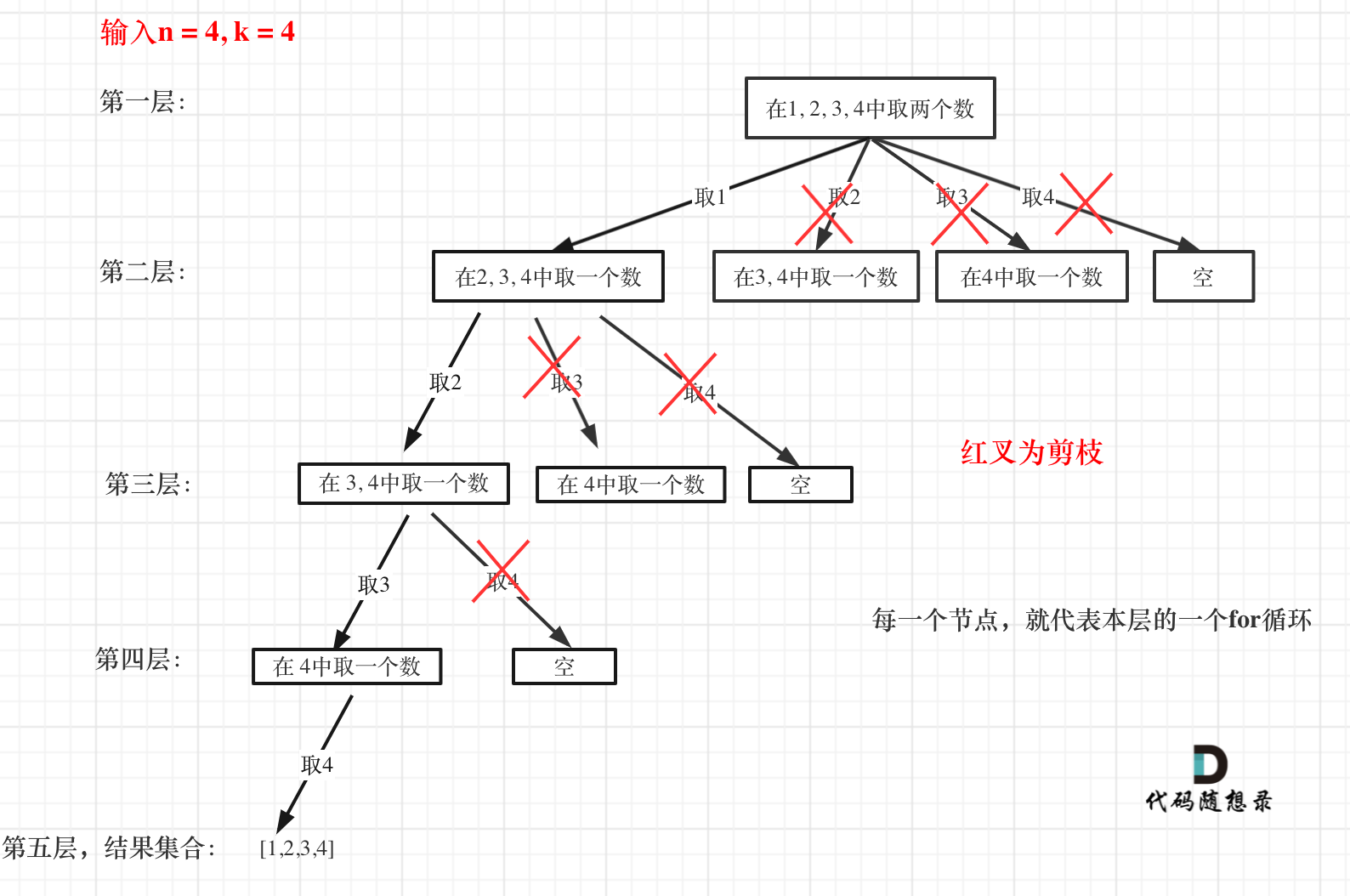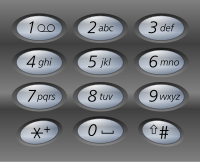回溯
77 组合
77. 组合
难度中等1043
给定两个整数
n和k,返回范围[1, n]中所有可能的k个数的组合。你可以按 任何顺序 返回答案。
示例 1:
输入:n = 4, k = 2 输出: [ [2,4], [3,4], [2,3], [1,2], [1,3], [1,4], ]示例 2:
输入:n = 1, k = 1 输出:[[1]]
解答
class Solution {
public List<List<Integer>> combine(int n, int k) {
List<List<Integer>> res=new ArrayList<>();
if(k<=0 || n<1){
return res;
}
Deque<Integer> temp=new LinkedList<>();
int begin=1;
backTrack(res,temp,begin,n,k);
return res;
}
public static void backTrack(List<List<Integer>> res, Deque<Integer> temp,int begin,int n, int k) {
if(temp.size()==k){
res.add(new ArrayList<>(temp));
return;
}
for (int i = begin; i <=n ; i++) {
temp.add(i);
backTrack(res,temp,i+1,n,k);
temp.removeLast();
}
}
}
优化
剪枝优化
在遍历的过程中有如下代码:
for (int i = startIndex; i <= n; i++) {
path.push_back(i);
backtracking(n, k, i + 1);
path.pop_back();
}
这个遍历的范围是可以剪枝优化的,怎么优化呢?
来举一个例子,n = 4,k = 4的话,那么第一层for循环的时候,从元素2开始的遍历都没有意义了。 在第二层for循环,从元素3开始的遍历都没有意义了。
这么说有点抽象,如图所示:

for (int i = startIndex; i <= n - (k - path.size()) + 1; i++) // i为本次搜索的起始位置
216 组合总和 III
216. 组合总和 III
难度中等501
找出所有相加之和为
n的k个数的组合,且满足下列条件:
- 只使用数字1到9
- 每个数字 最多使用一次
返回 所有可能的有效组合的列表 。该列表不能包含相同的组合两次,组合可以以任何顺序返回。
示例 1:
输入: k = 3, n = 7 输出: [[1,2,4]] 解释: 1 + 2 + 4 = 7 没有其他符合的组合了。示例 2:
输入: k = 3, n = 9 输出: [[1,2,6], [1,3,5], [2,3,4]] 解释: 1 + 2 + 6 = 9 1 + 3 + 5 = 9 2 + 3 + 4 = 9 没有其他符合的组合了。示例 3:
输入: k = 4, n = 1 输出: [] 解释: 不存在有效的组合。 在[1,9]范围内使用4个不同的数字,我们可以得到的最小和是1+2+3+4 = 10,因为10 > 1,没有有效的组合。
解答
class Solution {
public List<List<Integer>> combinationSum3(int k, int n) {
List<List<Integer>> res=new ArrayList<>();
Deque<Integer> temp=new LinkedList<>();
backTrack(res,temp,1,n,k);
return res;
}
private static void backTrack( List<List<Integer>> res, Deque<Integer> temp,int begin,int n,int k){
if(temp.size()==k ){
if(sum(temp)==n) {
res.add(new ArrayList<>(temp));
return;
}else{
return;
}
}
for (int i = begin; i <=9 ; i++) {
temp.add(i);
backTrack(res,temp,i+1,n,k);
temp.removeLast();
}
}
public static int sum(Deque<Integer> temp){
int sum=0;
for (Integer integer : temp) {
sum+=integer;
}
return sum;
}
}
17 .电话号码的字母组合
17. 电话号码的字母组合
难度中等1992
给定一个仅包含数字
2-9的字符串,返回所有它能表示的字母组合。答案可以按 任意顺序 返回。给出数字到字母的映射如下(与电话按键相同)。注意 1 不对应任何字母。
示例 1:
输入:digits = "23" 输出:["ad","ae","af","bd","be","bf","cd","ce","cf"]示例 2:
输入:digits = "" 输出:[]示例 3:
输入:digits = "2" 输出:["a","b","c"]提示:
0 <= digits.length <= 4digits[i]是范围['2', '9']的一个数字。
解答
class Solution {
public List<String> letterCombinations(String digits) {
List<String> res=new ArrayList<>();
if (digits == null || digits.length() == 0) {
return res;
}
String [] str=new String[]{"", "", "abc", "def", "ghi", "jkl", "mno", "pqrs", "tuv", "wxyz"};
StringBuilder builder=new StringBuilder();
backTrack(res,digits,builder,str,0);
return res;
}
private static void backTrack(List<String> res, String digits, StringBuilder builder,String[] str, int num) {
if(num==digits.length()){
res.add(builder.toString());
return;
}
String s=str[digits.charAt(num)-'0'];
for (int i = 0; i <s.length() ; i++) {
builder.append(s.charAt(i));
backTrack(res,digits,builder,str,num+1);
builder.deleteCharAt(builder.length()-1);
}
}
}
39 组合总和
39. 组合总和
难度中等2053
给你一个 无重复元素 的整数数组
candidates和一个目标整数target,找出candidates中可以使数字和为目标数target的 所有 不同组合 ,并以列表形式返回。你可以按 任意顺序 返回这些组合。
candidates中的 同一个 数字可以 无限制重复被选取 。如果至少一个数字的被选数量不同,则两种组合是不同的。对于给定的输入,保证和为
target的不同组合数少于150个。示例 1:
输入:candidates = [2,3,6,7], target = 7 输出:[[2,2,3],[7]] 解释: 2 和 3 可以形成一组候选,2 + 2 + 3 = 7 。注意 2 可以使用多次。 7 也是一个候选, 7 = 7 。 仅有这两种组合。示例 2:
输入: candidates = [2,3,5], target = 8 输出: [[2,2,2,2],[2,3,3],[3,5]]示例 3:
输入: candidates = [2], target = 1 输出: []提示:
1 <= candidates.length <= 30
1 <= candidates[i] <= 200
candidate 中的每个元素都 互不相同
1 <= target <= 500
解答
class Solution {
public List<List<Integer>> combinationSum(int[] candidates, int target) {
List<List<Integer>> res=new ArrayList<>();
Deque<Integer> path=new LinkedList<>();
Arrays.sort(candidates);
int sum=0;
int index=0;
backTrack(res,path,candidates,target,sum,index);
return res;
}
public static void backTrack(List<List<Integer>> res,Deque<Integer> path,int []candidates,int target,int sum,int index){
if(sum==target) {
res.add(new ArrayList<>(path));
return;
}
for (int i = index; i <candidates.length ; i++) {
if(sum+candidates[i]>target){
break;
}
path.add(candidates[i]);
backTrack(res,path,candidates,target,sum+candidates[i],i);
path.removeLast();
}
}
}
40. 组合总和 II
40. 组合总和 II
难度中等1026
给定一个候选人编号的集合
candidates和一个目标数target,找出candidates中所有可以使数字和为target的组合。
candidates中的每个数字在每个组合中只能使用 一次 。注意:解集不能包含重复的组合。
示例 1:
输入: candidates = [10,1,2,7,6,1,5], target = 8, 输出: [ [1,1,6], [1,2,5], [1,7], [2,6] ]示例 2:
输入: candidates = [2,5,2,1,2], target = 5, 输出: [ [1,2,2], [5] ]提示:
1 <= candidates.length <= 1001 <= candidates[i] <= 501 <= target <= 30
:dagger: 解答一(超时,但用例通过)
class Solution {
public List<List<Integer>> combinationSum2(int[] candidates, int target) {
List<List<Integer>> res=new ArrayList<>();
Deque<Integer> path=new LinkedList<>();
Arrays.sort(candidates);
int sum=0;
int index=0;
backTrack(res,path,candidates,target,sum,index);
return res;
}
public static void backTrack(List<List<Integer>> res, Deque<Integer> path, int []candidates, int target, int sum, int index){
if(sum==target && !res.contains(path)) {
res.add(new ArrayList<>(path));
return;
}
for (int i = index; i <candidates.length ; i++) {
if(sum+candidates[i]>target){
break;
}
path.add(candidates[i]);
backTrack(res,path,candidates,target,sum+candidates[i],i+1);
path.removeLast();
}
}
}
解答二
class Solution {
public List<List<Integer>> combinationSum2(int[] candidates, int target) {
List<List<Integer>> res=new ArrayList<>();
Deque<Integer> path=new LinkedList<>();
Arrays.sort(candidates);
int sum=0;
int index=0;
backTrack(res,path,candidates,target,sum,index);
return res;
}
public static void backTrack(List<List<Integer>> res, Deque<Integer> path, int []candidates, int target, int sum, int index){
if(sum==target) {
res.add(new ArrayList<>(path));
return;
}
for (int i = index; i <candidates.length ; i++) {
if(i>index && candidates[i]==candidates[i-1]){
continue;
}
if(sum+candidates[i]>target){
break;
}
path.add(candidates[i]);
backTrack(res,path,candidates,target,sum+candidates[i],i+1);
path.removeLast();
}
}
}
131 分割回文串
131. 分割回文串
难度中等1191
给你一个字符串
s,请你将s分割成一些子串,使每个子串都是 回文串 。返回s所有可能的分割方案。回文串 是正着读和反着读都一样的字符串。
示例 1:
输入:s = "aab" 输出:[["a","a","b"],["aa","b"]]示例 2:
输入:s = "a" 输出:[["a"]]提示:
1 <= s.length <= 16s仅由小写英文字母组成
class Solution {
public List<List<String>> partition(String s) {
List<List<String>> res = new ArrayList<>();
Deque<String> path = new LinkedList<>();
int index = 0;
backTrack(res, path, s, index);
return res;
}
public static void backTrack(List<List<String>> res, Deque<String> path, String s, int index) {
if (index >= s.length()) {
res.add(new ArrayList<>(path));
return;
}
for (int i = index; i < s.length(); i++) {
if (checkPalindrome(s, index, i)) {
String temp=s.substring(index,i+1);
path.add(temp);
}else{
continue;
}
backTrack(res, path, s, i + 1);
path.removeLast();
}
}
public static boolean checkPalindrome(String s, int start, int end) {
for (int i =start, j = end; i < j; i++, j--) {
if (s.charAt(i) != s.charAt(j)) {
return false;
}
}
return true;
}
}
93 复原ip地址
93. 复原 IP 地址
难度中等954
有效 IP 地址 正好由四个整数(每个整数位于
0到255之间组成,且不能含有前导0),整数之间用'.'分隔。
- 例如:
"0.1.2.201"和"192.168.1.1"是 有效 IP 地址,但是"0.011.255.245"、"192.168.1.312"和"192.168@1.1"是 无效 IP 地址。给定一个只包含数字的字符串
s,用以表示一个 IP 地址,返回所有可能的有效 IP 地址,这些地址可以通过在s中插入'.'来形成。你 不能 重新排序或删除s中的任何数字。你可以按 任何 顺序返回答案。示例 1:
输入:s = "25525511135" 输出:["255.255.11.135","255.255.111.35"]示例 2:
输入:s = "0000" 输出:["0.0.0.0"]示例 3:
输入:s = "101023" 输出:["1.0.10.23","1.0.102.3","10.1.0.23","10.10.2.3","101.0.2.3"]提示:
1 <= s.length <= 20s仅由数字组成
解答
注意要点:
1.判断ip是否有效
2.是针对原本字符串进行改变了
3.s=s.substring(0,i+1)+”.”+s.substring(i+1); 理解为什么要从0开始截取 而不是从startIndex
class Solution {
public List<String> restoreIpAddresses(String s) {
List<String> res=new ArrayList<>();
if(s.length()>12){
System.out.println(res);
}
int startIndex=0;
int pointNum=0;
backTrack(s,res,startIndex,pointNum);
return res;
}
public static void backTrack(String s,List<String> res,int startIndex,int pointNum){
if(pointNum==3){
if(isValid(s,startIndex,s.length()-1)){
res.add(s);
}
return;
}
for (int i = startIndex; i < s.length(); i++) {
if(isValid(s,startIndex,i)){
s=s.substring(0,i+1)+"."+s.substring(i+1);
pointNum++;
backTrack(s,res,i+2,pointNum);
s=s.substring(0,i+1)+s.substring(i+2);
pointNum--;
}else{
break;
}
}
}
private static boolean isValid(String s,int startIndex,int endIndex) {
int num=0;
if(startIndex>endIndex){
return false;
}
//以0开头 且不是单位 为false
if(s.charAt(startIndex)=='0' && startIndex!=endIndex){
return false;
}
for (int i = startIndex; i <= endIndex; i++) {
if(s.charAt(i)<'0' || s.charAt(i)>'9'){
return false;
}
num=num*10+s.charAt(i)-'0';
if(num>255){
return false;
}
}
return true;
}
}
78 子集
78. 子集
给你一个整数数组
nums,数组中的元素 互不相同 。返回该数组所有可能的子集(幂集)。解集 不能 包含重复的子集。你可以按 任意顺序 返回解集。
示例 1:
输入:nums = [1,2,3] 输出:[[],[1],[2],[1,2],[3],[1,3],[2,3],[1,2,3]]示例 2:
输入:nums = [0] 输出:[[],[0]]提示:
1 <= nums.length <= 10-10 <= nums[i] <= 10nums中的所有元素 互不相同
解答
class Solution {
public List<List<Integer>> subsets(int[] nums) {
List<List<Integer>> res=new ArrayList<>();
Deque<Integer> path=new LinkedList<>();
int begin=0;
backTrack(res,path,begin,nums);
return res;
}
public static void backTrack(List<List<Integer>> res,Deque<Integer> path,int begin,int []nums){
res.add(new ArrayList<>(path));
for (int i = begin; i <nums.length ; i++) {
path.add(nums[i]);
backTrack(res,path,i+1,nums);
path.removeLast();
}
}
}
90 子集②
90. 子集 II
难度中等874
给你一个整数数组
nums,其中可能包含重复元素,请你返回该数组所有可能的子集(幂集)。解集 不能 包含重复的子集。返回的解集中,子集可以按 任意顺序 排列。
示例 1:
输入:nums = [1,2,2] 输出:[[],[1],[1,2],[1,2,2],[2],[2,2]]示例 2:
输入:nums = [0] 输出:[[],[0]]
解答:
class Solution {
public List<List<Integer>> subsetsWithDup(int[] nums) {
List<List<Integer>> res=new ArrayList<>();
Deque<Integer> path=new LinkedList<>();
int begin=0;
Arrays.sort(nums);
backTrack(res,path,begin,nums);
return res;
}
public static void backTrack(List<List<Integer>> res, Deque<Integer> path,int begin,int []nums){
res.add(new ArrayList<>(path));
for (int i = begin; i <nums.length ; i++) {
if(i>begin && nums[i]==nums[i-1]){
continue;
}
path.add(nums[i]);
backTrack(res,path,i+1,nums);
path.removeLast();
}
}
}
491 递增子序列
491. 递增子序列
难度中等471
给你一个整数数组
nums,找出并返回所有该数组中不同的递增子序列,递增子序列中 至少有两个元素 。你可以按 任意顺序 返回答案。数组中可能含有重复元素,如出现两个整数相等,也可以视作递增序列的一种特殊情况。
示例 1:
输入:nums = [4,6,7,7] 输出:[[4,6],[4,6,7],[4,6,7,7],[4,7],[4,7,7],[6,7],[6,7,7],[7,7]]示例 2:
输入:nums = [4,4,3,2,1] 输出:[[4,4]]提示:
1 <= nums.length <= 15-100 <= nums[i] <= 100
解答 (用模板套 不好做出来)
class Solution {
public List<List<Integer>> findSubsequences(int[] nums) {
List<List<Integer>> res=new ArrayList<>();
Deque<Integer> path=new LinkedList<>();
int begin=0;
backTrack(res,path,begin,nums);
return res;
}
private static void backTrack(List<List<Integer>> res, Deque<Integer> path, int begin, int[] nums) {
if(path.size()>=2){
res.add(new ArrayList<>(path));
}
int[] used = new int[201];
for (int i = begin; i <nums.length ; i++) {
if(!path.isEmpty() && nums[i]<path.getLast() || used[nums[i]+100]==1)
{
continue;
}
used[nums[i]+100]=1;
path.add(nums[i]);
backTrack(res,path,i+1,nums);
path.removeLast();
}
}
}
46 全排列
46. 全排列
难度中等2104
给定一个不含重复数字的数组
nums,返回其 所有可能的全排列 。你可以 按任意顺序 返回答案。示例 1:
输入:nums = [1,2,3] 输出:[[1,2,3],[1,3,2],[2,1,3],[2,3,1],[3,1,2],[3,2,1]]示例 2:
输入:nums = [0,1] 输出:[[0,1],[1,0]]示例 3:
输入:nums = [1] 输出:[[1]]提示:
1 <= nums.length <= 6-10 <= nums[i] <= 10nums中的所有整数 互不相同
解答
跟以往不一样的是 for(int i=0;i<nums.length;i++)
而以往是 for(int i=begin;i<nums.length;i++)因为排列问题,每次都要从头开始搜索,例如元素1在[1,2]中已经使用过了,但是在[2,1]中还要再使用一次1。
class Solution {
public List<List<Integer>> permute(int[] nums) {
boolean []used=new boolean[nums.length];
List<List<Integer>> res=new ArrayList<>();
Deque<Integer> path=new LinkedList<>();
int begin=0;
backTrack(res,path,used,begin,nums);
return res;
}
private static void backTrack(List<List<Integer>> res, Deque<Integer> path, boolean[] used, int begin, int[] nums) {
if(path.size()==nums.length){
res.add(new ArrayList<>(path));
return;
}
for (int i = 0; i <nums.length ; i++) {
if(used[i]){
continue;
}
used[i]=true;
path.add(nums[i]);
backTrack(res,path,used,i+1,nums);
used[i]=false;
path.removeLast();
}
}
}
47 全排列2
47. 全排列 II
难度中等1120
给定一个可包含重复数字的序列
nums,按任意顺序 返回所有不重复的全排列。示例 1:
输入:nums = [1,1,2] 输出: [[1,1,2], [1,2,1], [2,1,1]]示例 2:
输入:nums = [1,2,3] 输出:[[1,2,3],[1,3,2],[2,1,3],[2,3,1],[3,1,2],[3,2,1]]提示:
1 <= nums.length <= 8-10 <= nums[i] <= 10
解答
class Solution {
public List<List<Integer>> permuteUnique(int[] nums) {
boolean []used=new boolean[nums.length];
List<List<Integer>> res=new ArrayList<>();
Arrays.sort(nums);
Deque<Integer> path=new LinkedList<>();
int begin=0;
backTrack(res,path,used,begin,nums);
return res;
}
private static void backTrack(List<List<Integer>> res, Deque<Integer> path, boolean[] used, int begin, int[] nums) {
if(path.size()==nums.length){
res.add(new ArrayList<>(path));
return;
}
for (int i = 0; i <nums.length ; i++) {
if (i > 0 && nums[i] == nums[i - 1] && used[i - 1] == false) {
continue;
}
if(used[i]==false){
used[i]=true;
path.add(nums[i]);
backTrack(res,path,used,i+1,nums);
used[i]=false;
path.removeLast();
}
}
}
}




